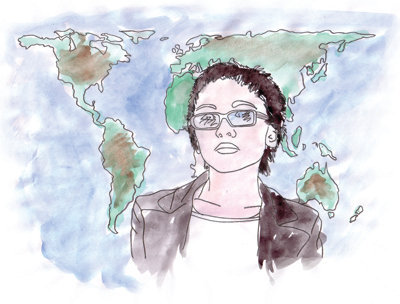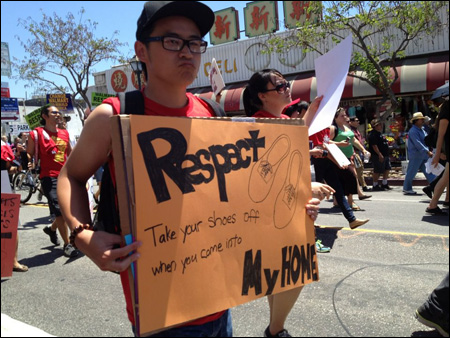A friend (and colleague) and I were talking about the many situations in which schools will allow a student to informally change their name, without having to go through some process of filling out forms and getting approved by the school bureaucracy (or even more burdensome, having to go to court to get an order of name change).
This was in the context of making the case that if schools allowed students to easily change their names, they should not be singling out transgender or gender non-conforming students for especially burdensome name-change requirements when they requested to be called by their preferred name.
As some background, my colleague is White. We were talking with another attorney who was Chinese (like me). My colleague and I were quickly listing the contexts in which non-transgender students might ask for, and routinely get, an informal name change: in the case of a divorce, a student might change their last name to the custodial parent's; a student might prefer to use their middle name; a student might prefer to use an abbreviation of their full name (e.g., John instead of Jonathan, Nick instead of Nicholas). Then my colleague added that a student with a non-Anglo name might choose to take on an Anglo name.
This brought me up short. I was a little stunned, to be honest. I don't think that my colleague was intending to bring up the entire background of "othering," of Asian people feeling never quite at home in a country (indeed, because of colonization, a world) full of Anglo names. I wanted to say: let's be clear - informally taking on an Anglo name is not a preference, it is almost necessarily a (somewhat bitter) compromise. The deal is: I'll take on a less "foreign" sounding name, and you accept me as fully a member of this school community. Unfortunately, of course, since racism persists (yes! even among schoolchildren!), the deal is never made good on.
Anyway, that's sort of what was running through my head, but I didn't say anything at the time. Partly because I didn't feel that strongly about it right then (or am I numb to the pain of racism?), and partly because I didn't want to get into a whole discussion about it at the time (it was lunch!). Today, I decided to send an email to my friend about it. Here's what I wrote:
I just wanted to drop you a note about one of the examples you used when we were talking informally . . . about situations in which students get a school to acknowledge and respect a preferred name. You gave as one example that some students with non-Anglo names would adopt a name that's easier for people to say. I totally agree that this is a not uncommon practice, and that you are right that many teachers probably are almost even relieved to make the switch to the more Anglo name, but I wanted to let you know that it brought up the whole history of racism and xenophobia in this country for me.I didn't feel THAT strongly about it at the time (or I would have told you right away, of course!), but it did make me somewhat uneasy, and when I was thinking about this later, I thought I'd let you know. Part of me feels like, even though it's actually a great example of a common reason for students to use a preferred name over the name given at birth, that it risks bringing up that whole history for someone in the room. We were talking about it informally in a small circle of friends, so that was obviously less risky!However, I think that if we use this example in public (and I kind of want to at some point), we should acknowledge that part of what's going on there is a kind of compromise with a racist society, and that this is something people of color do all the time to have some safety or to not constantly be overtly "othered". I'm sure there's some less "heavy" way to acknowledge that, of course, and would love to get your ideas.I thought that you did a great job acknowledging a related issue with gender identity and medical intervention (that some trans people decide not to change their bodies in a particular socially-prescribed way, acknowledging that it's society that has a problem with their bodies, not them, and that all people deserve respect for their gender identity whatever medical intervention they have or have not had).






